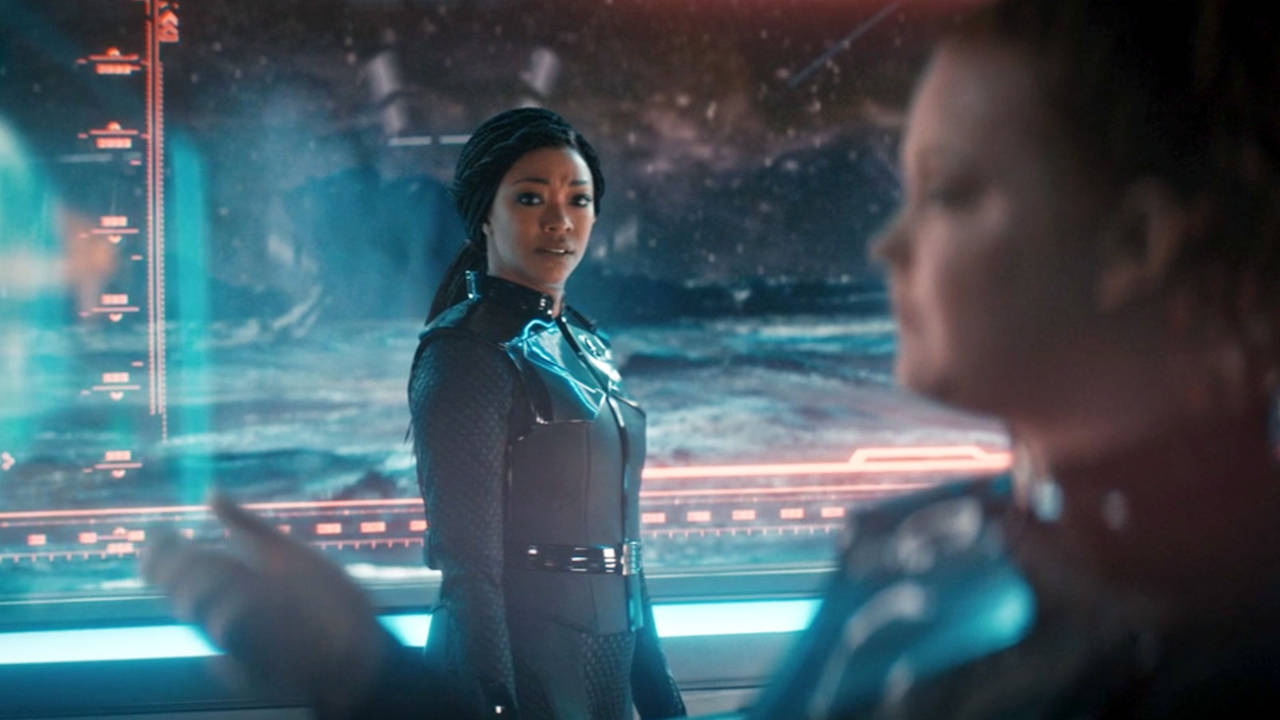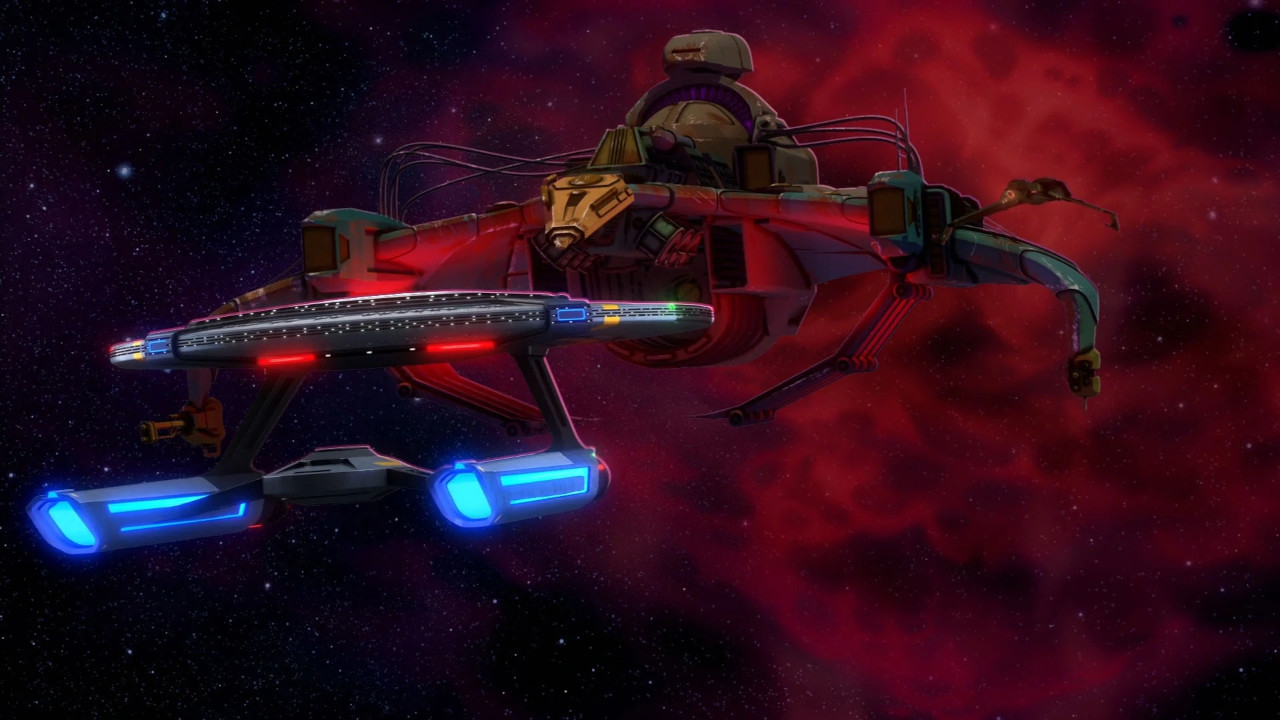Article Content
Computer almost defeated by anomaly, feelings

"Stormy Weather" is a mysterious, focused, and claustrophobic sci-fi yarn that works pretty well … up until it doesn’t. This is a story about the crew working a single problem on multiple fronts. Meanwhile, the darkness of the rift (reminiscent of Voyager‘s "The Void" and V’Ger’s cloud from ST:TMP) and the unknown of what’s coming at the ship and whether the ship can escape, give the episode a tense, atmospheric quality.
Unfortunately, the episode started to fall apart for me once it became clear the path to escaping the rift was going to be charted through the emotional journey of Zora, the ship’s conscious (and now emoting) computer. It’s been a running joke for a while now that Discovery is all about the characters’ feelings. But with "Stormy Weather" it’s now even about the ship’s feelings. The ship is in crisis because of the negative effects of the rift’s strange properties, but it’s at even greater risk because Zora is so emotionally compromised that it (she?) can barely carry out core functions. Folks, our starship is a basket case.
‘All is Possible’ in the diplomatic community

"All Is Possible" is evidence that Discovery is trying. It’s trying to build out the universe, develop and empathize with its characters, and adhere to a storytelling philosophy that relies on dialogue rather than overblown action. It’s also, as I’ve said previously, trying to be the Trek show most in touch with its feelings. If you look back at the first season versus this one, that’s the most notable shift in priority. In order to be at peace with the universe, our characters must first be at peace with themselves.
That can make the show cloying and treacly at times, and this episode has its moments of that, but at least its heart is in the right place. "All Is Possible" focuses on three main storylines, with two of them being about a central character dilemma, and the third one being the most interesting and series-impacting with its focus on Federation politics.
Discovery makes some better choices

"Choose to Live" is the best episode of Discovery in a very long time, since maybe "Die Trying." It works because it mostly keeps its stories grounded and straightforward, rather than excessive and overwrought, and puts forward sincere interest in them. Instead of shaking the camera for an hour while artificially employing emotional manipulation, it tells a reasonably good story and lets the emotional notes grow naturally from it. This is a major course correction that, while not a groundbreaking or stellar example of Trek, is a good example of it, and gives me hope that this season might be able to find its footing.
Stamets has a theory that the gravimetric anomaly, now dubbed the dark-matter anomaly or "DMA," might be a primordial wormhole, thereby explaining its ability to change directions spontaneously. I’m not going to pretend I think this makes any scientific sense, because I honestly don’t keep track of the sci-fi minutiae within Trek beyond its most core elements. But as long as they convince me the details are being considered by somebody in the moment and they try to explain them, I’m game. In this case, they make the case that Stamets is lacking the key evidence he needs for his wormhole theory in the presence of tachyons (which were a key clue to DS9‘s wormhole, so hey, there’s that). So he wants more scientific minds beyond the Federation’s to look into the possibility.
‘Anomaly’: We’ll feel our way through this

As I was watching "Anomaly," I realized we’ve reached the Hallmark Greeting Card stage of the Trekkian technobabble episode. This episode is overly earnest Touchy Feely Trek taken to a level of near self-parody. It wants so badly to engage on an emotional level that it does so to the point of extreme pushiness, while failing to engage on the level I really wanted to meet it on, which was pseudo-intellectual. I wanted to understand what this anomaly was and how it kinda-sorta works, but that’s beyond the scope of this episode, which is more about how everyone feels about everything that’s happening.
Oh, sure, it pretends like it’s all about the data and the research and the science of it all, but is it really? At one point, the anomaly causes all artificial gravity to go haywire and makes everyone float above their stations before being slammed back to the deck. That’s a kinda cool visual, but most of the episode is the usual camera-shaking and sparks exploding that we’ve come to expect in Star Trek jeopardy shows for decades, and this episode pummels us with it relentlessly.
‘Discovery’ returns: Federation to the rescue, like it or not

Overall, "Kobayashi Maru" is fine, with things about it that are good, even. The plot is a straightforward if overdone peril-and-rescue scenario in which the crew must come to the aid of a Federation space station that’s spiraling out of control for mysterious reasons. This plot, naturally, makes use of the convenient device of excessive interference that renders the transporters useless (still a problem in the 32nd century!) and therefore requires a much more protracted and dangerous operation.
The rescue must be attempted by boarding the space station after flying through a violent debris field while Discovery‘s shields are endlessly buffeted and weakened and the ticking clock counts down. As these sort of Trek staples go, with the camera shaking and the sparks exploding, it’s reasonably well executed, with a certain effective intensity. But little stands out here for good or ill — which is a big improvement over much of last season’s closing episodes.
‘Lower Decks’ season finale: Disaster, optimized

The Cerritos is assigned to its first First Contact mission, assisting the USS Archimedes under the command of Freeman’s old friend Captain Sonya Gomez (Lycia Naff, returning for an animated version of a character she played in just two episodes on TNG more than 30 years ago, and yet who seems to loom much larger in fan circles than most guests with such limited appearances). This happens while Freeman is on the verge of a promotion that will take her to a new ship, leaving her daughter and crew behind. Freeman has not shared this information with anyone yet, but when Mariner overhears her talking about it, the cat is out of the bag, because Mariner proceeds to blab to the rest of the crew (who are not happy to learn this) out of pure spite.
This opens a new conflict between Mariner and her mother, and while it ultimately will circle back around to "Mariner is just acting out because she loves her mom and feels sad about the prospect of her leaving," it can still be a little tiresome to have the characters retread such traveled ground, especially after the various breakthroughs we’ve had on this front (especially in "Crisis Point," which remains the series’ best episode).
‘Wej Duj’: Triple the Lower Decks

Well, imagine that. Right after I expressed my disappointment with the bulk of this season, Lower Decks went and turned itself around and put itself on a multi-episode roll. Now we have "wej Duj," the best episode of the second season so far, and one that works because it makes the effort to tell a solid story, link multiple threads together, expand the series’ scope, and find a good deal of humor without needing to do a lot of "jokes."
This is like the "Lower Decks" of Lower Decks, in that it finds novelty in an off-format presentation, featuring a bunch of characters we’ve never met before. The episode is seen from the point of view of not just the Cerritos Lower Decks, but also the Lower Decks on a Klingon Bird of Prey and a Vulcan science vessel. That these three strands are on a collision course probably goes without saying, but one of the pleasures of this episode is seeing these vastly different takes on low-ranking officers and seeing how all their stories inevitably converge.
Seeking the holodeck high score

"I, Excretus" is a pretty good example of what Lower Decks probably ultimately aspires to be. This is a story about an entire ship of scrappy underdogs — whose Lower Deckers are the most underdogged of the underdogs — working on a ship that don’t get no respect. They must prove themselves to the people who don’t respect them, in this case a Starfleet drill administrator named Shari Yn Yem (Lennon Parham), who has come on board to put the crew in a series of individualized holodeck-simulated mission drills where their performance is scored. The twist: The ensigns become command officers and the command officers become ensigns.
Without Kirk, who can outsmart the computer?

"Where Pleasant Fountains Lie," the best episode of the (overall disappointing, so far) second season, is proof that less is more when it comes to the things most typically associated with Lower Decks. Less freneticism, fewer Trek references, less obviousness. Instead, this is a story that has a solid couple of stories and runs with them. The episode mostly plays it straight, but the humor and fun are baked into the situations rather than glopped on top like a distracting frosting. The reference that stood out for me was the joke about phaser rifles: "How are those different from regular phasers?" "Uh, they take two hands?" Yes. Nailed it. Fun-poking, subtle, and short. The trifecta, if you’re going to do a joke like that. And it works because it’s one of a few, rather than one of so many.
Review: ‘Star Wars: The Rise of Skywalker’

Endings are hard. This we know.
Lost. Battlestar Galactica. Game of Thrones. The Sopranos. The Matrix trilogy. The first Star Wars trilogy. The prequel Star Wars trilogy. The list is endless. The question is always the same: "Can they stick the landing?" Invariably, the reception is mixed, although some receptions are more mixed than others. (Does that even make sense? Who cares?)
The Rise of Skywalker had the pressure to not only resolve a trilogy, but three trilogies. What I’ve learned over the years is when it comes to any long-standing work of pop entertainment, the creators have an almost impossible job, because they can’t please everyone. The reality is that we all find it fun to imagine our version of the final chapter of a movie or TV series. But the creators have the responsibility of having to actually make a choice and do something. They can’t do everything. And their choices will not please everyone.
My long-delayed review of this movie is not likely to please everyone, either. Or maybe anyone. Like my Star Trek Into Darkness review, I feel like I’m alone in the wildnerness by not hating this movie, and actually sort of liking it.
